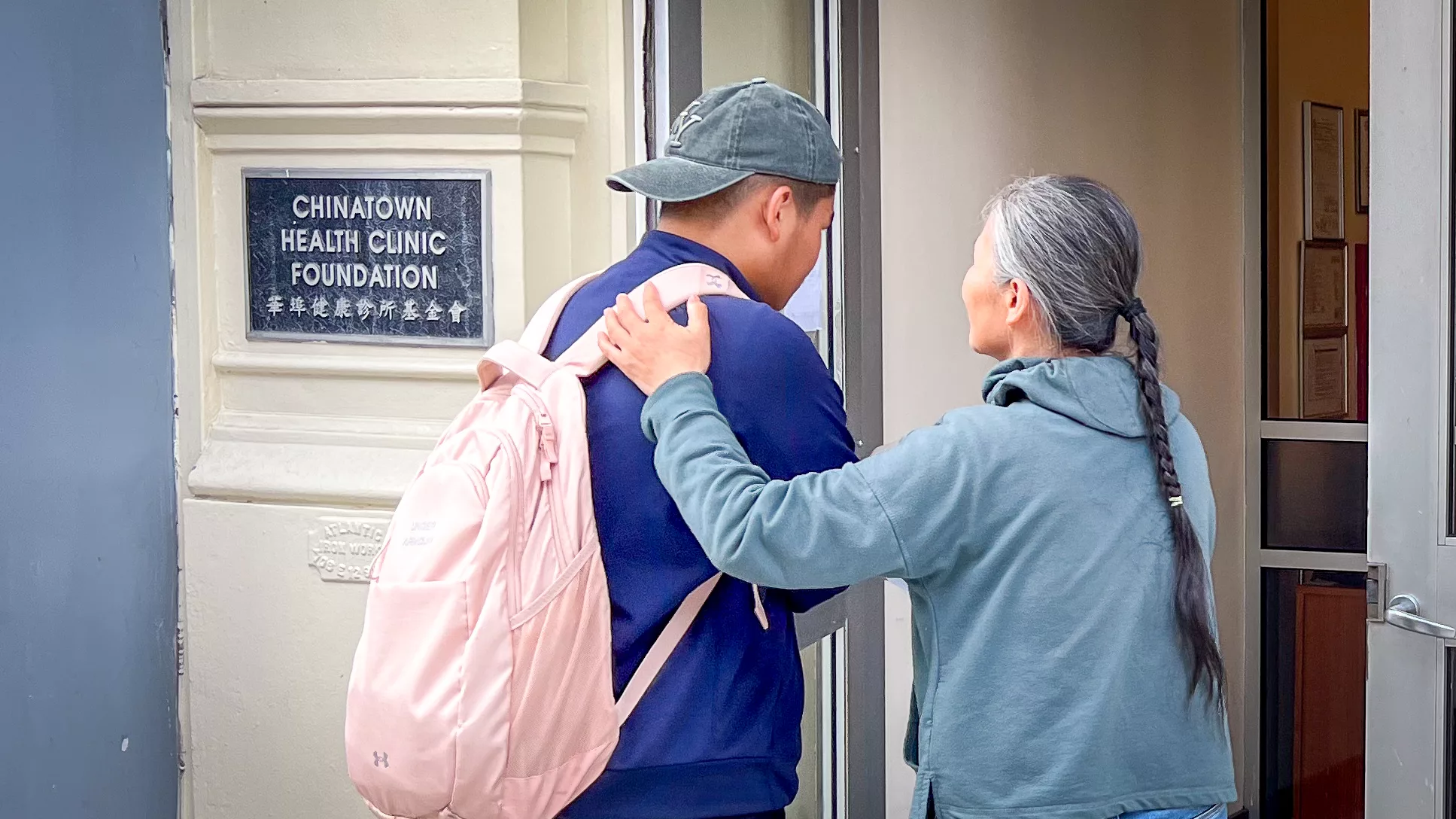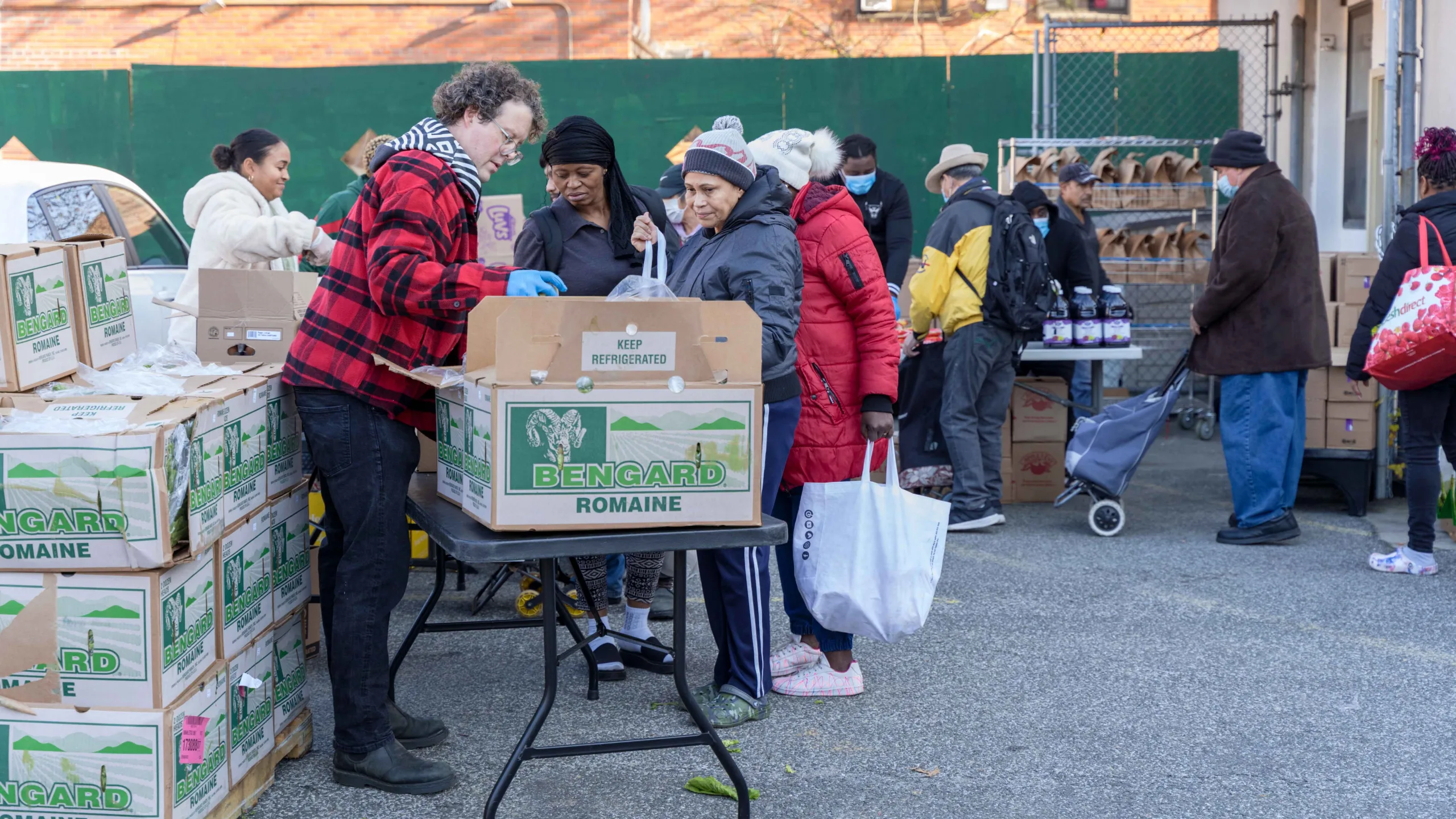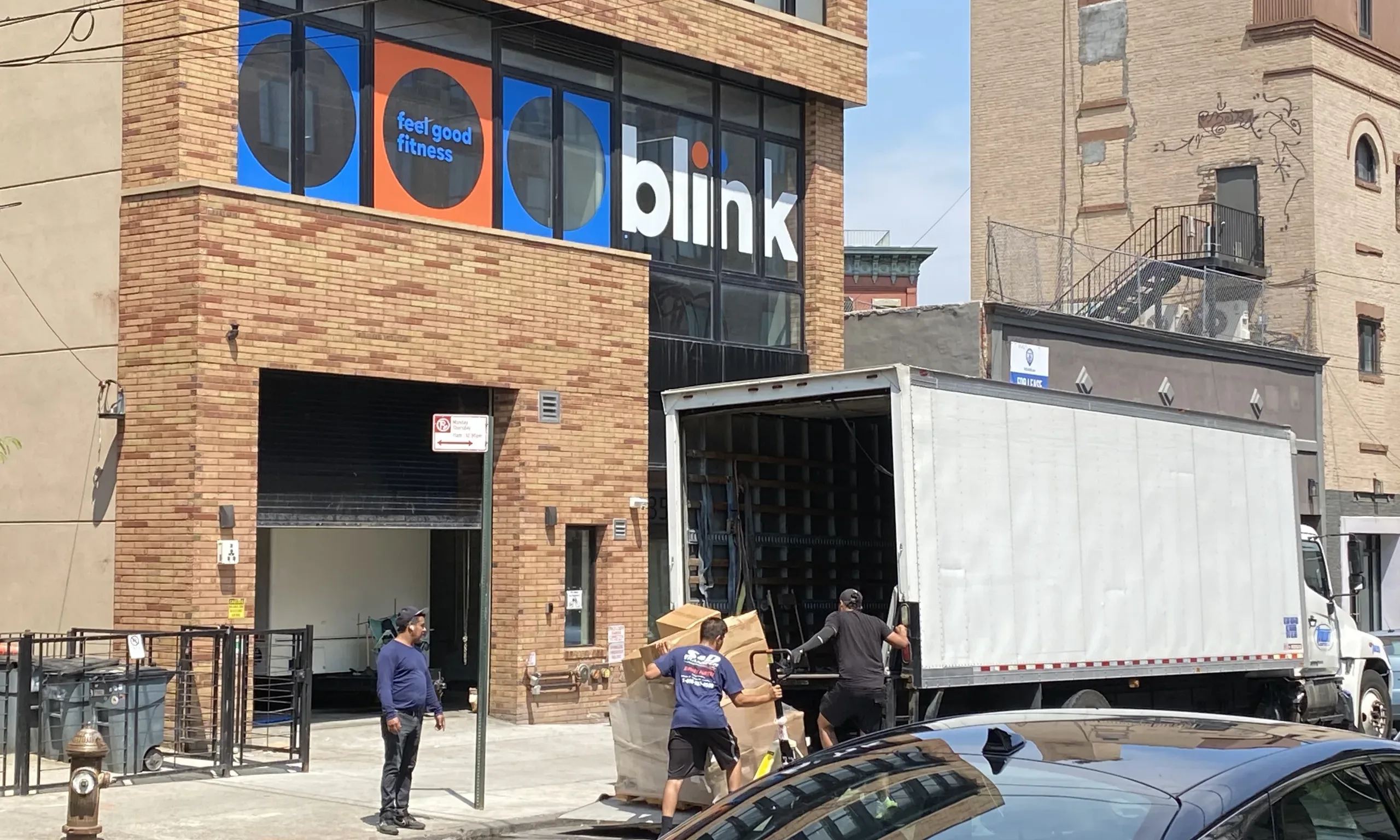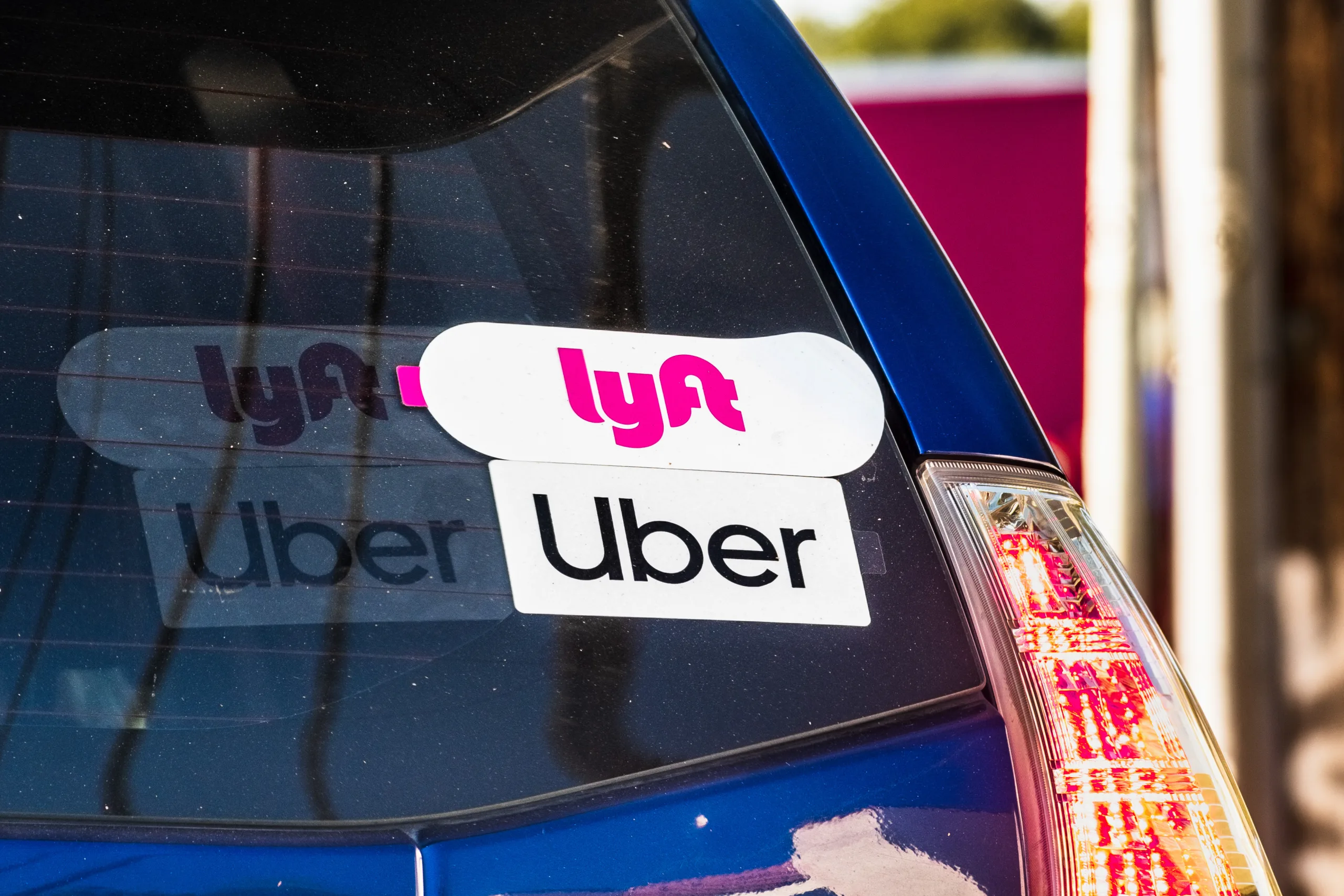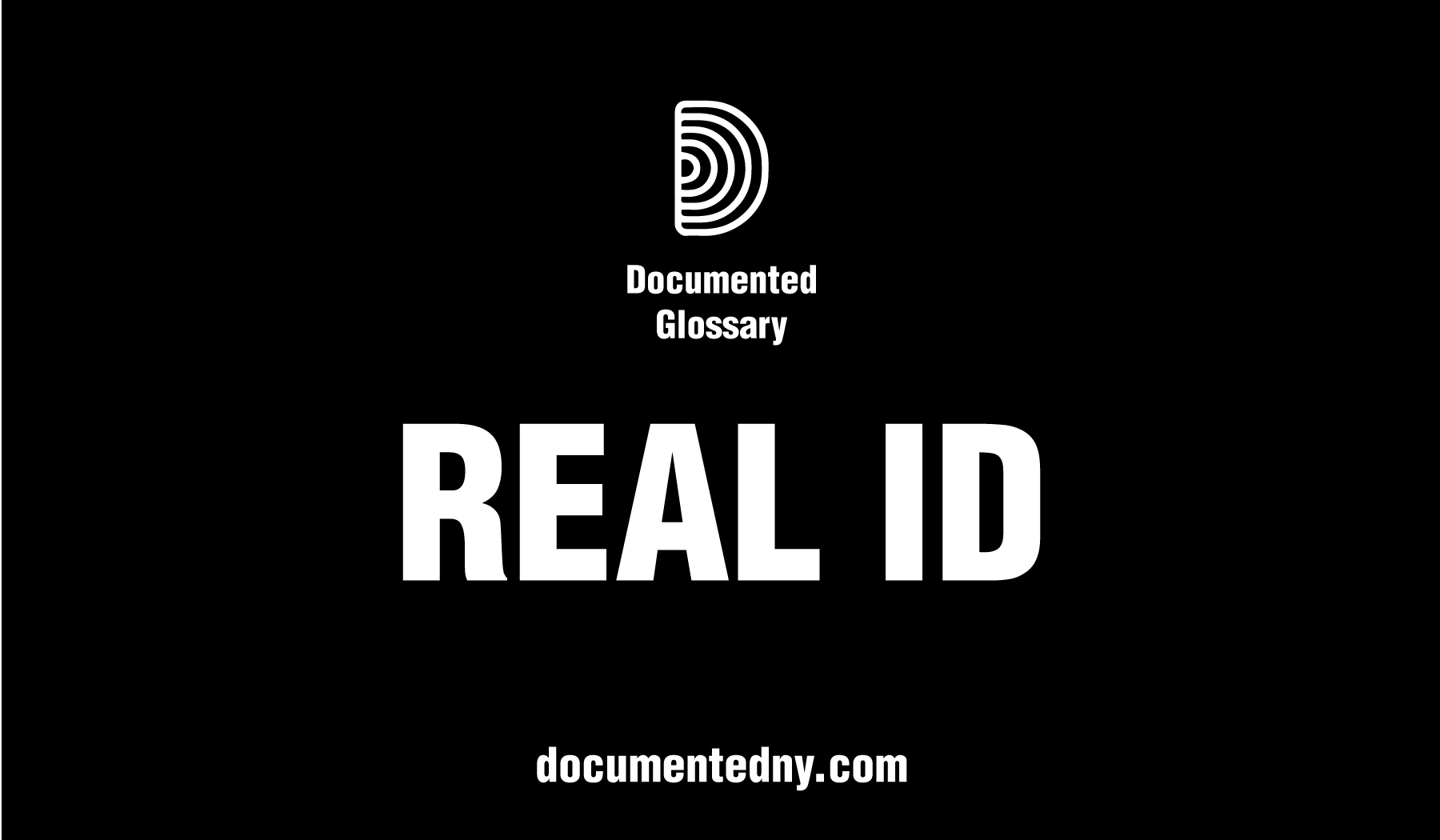S.L. Zhao and her son, B.W. Qiu had just crossed the U.S.-Mexico border into Tecate, California, completely exhausted, when they collapsed on the cold ground. About 15 minutes later, the beams of car headlights illuminated their faces — it was three Border Patrol cars. Zhao wasn’t nervous; she knew their arduous journey to the United States was nearing its end.
Zhao and her son were ordered to enter the Border Patrol processing facility, but her son refused. Along his journey through Central American countries, he had witnessed aggressive police officers extorting migrants and now feared the Customs and Border Protection officers in uniform.
It was a late night on February 22, and Zhao, 56, stood in the chilly wind with her son for about three hours. Among the thousands of Chinese immigrants who arrived in the U.S. this year, Zhao and her 21-year-old son were a unique case. In 2020, Qiu was diagnosed with moderate intellectual disability by Lianjiang County Hospital in Fujian province in China. Zhao later learned that her son had symptoms that seemed to match the traits of someone with autism spectrum disorder, a developmental condition that can impact a person’s ability to communicate, interact, learn, and behave. (Note, while Zhao suspects her son has autism she has not been given an official diagnosis from a medical professional in the U.S.)
“If you don’t go inside, I will freeze to death here, and then no one will be able to take care of you,” Zhao, trembling in her worn-out, thin down jacket, told her son. (Zhao requested their full names be withheld to protect her family from potential negative consequences in China.)
A nearby CBP officer also tried to comfort Qiu, saying, “Don’t be afraid, we will protect you.” Knowing that Qiu enjoyed listening to music, the officer played some songs on his phone to calm him down. He then pulled out his phone and opened a translation app, which told Zhao, “You made the right decision coming here. The U.S. government will help you. You must stay strong.”
In the past 21 years, Zhao said she never shed a tear despite the numerous challenges she faced because of her son’s intellectual disability. She had not cried when, five years ago, her son, then 16 years old, returned home from school covered in bruises. She was shocked to discover that her son had been bullied and even beaten by his classmates and teacher. She had not cried either, when Qiu, who was barely able to communicate, refused to attend any school and stayed at home. But after crossing the border with her son in February this year to seek treatment in the United States, she broke down. Reading this message on the phone, Zhao hugged her son and burst into tears. Shortly afterward, the two finally entered the CBP building.
A long road to seeking help
Three days later, Zhao and her son made their way to Flushing, Queens, after being released from the CBP building. Zhao realized that their challenges were far from over. During the day, she would inquire about organizations that could help her son and look for lawyers who could assist them with asylum applications. At night, she and her son worried about where they would sleep.
Zhao’s husband has been living in the U.S. for a year after overstaying his tourist visa, and sometimes, his landlord kindly allowed them to sleep on a mattress in the living room. When it wasn’t convenient for them to stay, Zhao and her son had to find a nearby family hostel that cost $20 per night.
For Zhao, who knows nothing about New York, and does not speak English, the process of establishing connections with social services and resources is not easy. Her son Qiu cannot read or write, and struggles to communicate. Qiu often acts on his curiosity by touching strangers or their belongings without permission. He also frequently has emotional turbulence or becomes anxious. Zhao has to pay full attention to Qiu all the time to ensure he doesn’t “cause any trouble.”
Many community organizations or companies asked her to fill out personal information forms, leaving her confused about which were legitimate. Three months after arriving in the U.S., Zhao still didn’t know where to seek help. Then, one day, she saw a post on Documented’s WeChat account about a mental health guide for the Chinese community and decided to contact the newsroom.
She was informed that Hamilton-Madison House would hold an autism workshop the following Wednesday. At the workshop, she learned that her son would be better served by NYS Office for People With Developmental Disabilities (OPWDD) and was then referred to staff members from the Educational Alliance who attended the workshop.
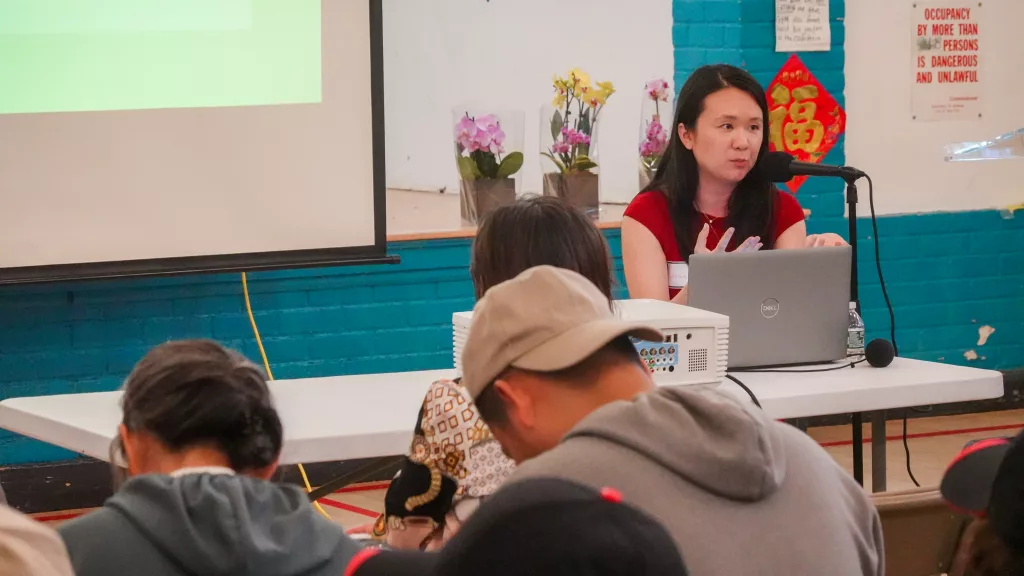
The maze of navigating service for her son was welcomed, but Zhao said the following days had been a roller coaster. Each piece of new information brought her hope, only for reality to repeatedly shatter it.
Chiafen Liu, the director of social work at Educational Alliance’s Manny Cantor Center, became Zhao’s son’s case manager. She connected Zhao with the Charles B. Wang Community Health Center (CBWCHC) for medical services and the Chinese-American Planning Council (CPC) for Special Needs Services, which both provide Zhao support in Chinese.
In the beginning, Zhao wanted to apply for a disability certificate for her son, similar to the one she could get in China, to show people that her son was disabled and prevent others from blaming or attacking him for his unintended actions. However, such a certificate doesn’t exist in the U.S., according to Wei Zhang, a service coordinator from CPC who is helping Zhao’s son apply for services provided by OPWDD.
But even for long existing organizations like CPC, Educational Alliance and CBWCHC, Zhao’s case is rare and challenging.
“It’s relatively unusual for someone with special needs to come [to the U.S.],” said Dr. Ady Oster, chief of population health at Charles B. Wang Community Health Center. The federally qualified community health center has served thousands of new immigrants, including asylum seekers and refugees.
Dr. Oster explained that, in general, the undocumented immigrants he sees are working-age individuals who have traveled independently, and are physically able to travel and come to the U.S. for work.
Identifying needs
On June 24, Zhao and Qiu went to the Charles B. Wang Community Health Center for Qiu’s initial health check-up. The visit was to evaluate Qiu’s overall physical and mental status and to begin the process of identifying any of his needs or disabilities. This would lead to a referral to social work to start documenting the disability and the legal process of applying for benefits and guardianship, according to Dr. Oster.
With the help of a Chinese translator and Zhao, Qiu followed Dr. Oster’s and his assistant’s instructions to have his height and weight measured. However, the process was not entirely smooth. The doctor wanted to do a blood test for Qiu.
Zhao translated the doctor’s question for her son. “Can they give you a shot?” she asked Qiu. “It’s going to be quick, okay?”
She extended her thumb and index finger, mimicking the shape of a needle. Qiu frowned and shook his head, pushing Zhao’s hand away while leaning back. Qiu was afraid of and resistant to some medical equipment, including needles. Zhao then tried to persuade Qiu to accept the blood test by promising him candies, hoping to avoid a return to the medical center for another check-up, but she failed. In the end, the blood test was not completed as planned.
For Zhao and her son, each outing is a significant challenge for them. Unfamiliar with New York City’s public transportation, Zhao and Qiu usually leave several hours early to arrive on time. Often, they don’t consume any food until they return home, “we cannot afford dining out,” Zhao said.
Currently, the most urgent issue for the family is helping Qiu access disability benefits, which could provide them essential support such as daycare for Qiu and respite services for Zhao.
But Dr. Oster explained that to qualify for these benefits, one generally needs to undergo official testing of intellectual and social functioning to establish the disability. Without insurance, these tests can be prohibitively expensive for most families.
“It requires a few hours of work from highly trained specialists,” Dr. Oster said. “If someone has to pay out of pocket, it could cost between $3,000 and $5,000.”
Currently, Zhao is working with an immigration lawyer on their asylum case. The lack of legal immigration status further limits their ability to access necessary resources, such as their eligibility for Medicaid.
In addition, Qiu’s age presents another obstacle to obtaining help. Zhang explained that, since Qiu does not have Medicaid, CBWCHC will use the OPWDD-granted non-Medicaid funds to assist them. This specific fund is designated for individuals in their situation. However, Zhang has time constraints to apply for OPWDD services for Qiu, who turned 21 this March. To qualify for OPWDD services, a valid diagnosis of a condition is required, and the condition must have begun before age 22. According to Zhang, the evaluation process for Qiu’s eligibility for these services can typically take over six months to complete.
Zhang said he had tried to help Qiu apply for a special needs school, but the Department of Education informed him that they could not conduct an enrollment assessment for Qiu because the age limit for admission is 21. By the time the assessment is completed, Qiu would have little time left to attend school.
This news has left Zhao devastated, as it means she must care for her son full-time and cannot earn an income to support both herself and Qiu.
‘Obstacles everywhere’
On a Sunday in June, when Zhao was asked by a social worker at the Charles B. Wang Community Health Center about the services she needed during another evaluation for her son, the exhaustion and despair accumulated over months of running around without solving the issue of her son’s care overwhelmed her and for the second time in 21 years, she couldn’t help but burst into tears.
“I know many organizations are helping me, but without legal status, there are obstacles everywhere,” Zhao said. She said she almost lost hope that her son could get the necessary resources and help.
Zhang was empathetic. “I understand how she feels,” he said. “She is exhausted. What we are facing now is a race between getting services for Qiu and Zhao running out of energy.”
Zhang is working tirelessly to help Qiu prepare the OPWDD application package, but the process is prolonged because of the limited number of Mandarin-speaking service providers in New York City, the complexity of the application, a backlog of past applications, and Qiu’s lack of essential paperwork, highlighting the need for government investment in training and employing Mandarin and Cantonese-speaking specialists and social workers.
“The resources available to English-speaking immigrants versus non-English-speaking immigrants are vastly different,” Liu, Qiu’s case manager, said. “Language barriers prevent them from expressing their needs and seeking the help they require.”
Erin Silk, a spokesperson of OPWDD, in a statement said that OPWDD works with Georgetown University’s National Center for Cultural Competence to create a framework for culturally responsive outreach and partner with immigrant communities, like the CPC, to connect underserved individuals with our services.
Regarding Qiu’s case, she said, “We are happy to look into this person’s situation if they would like to share information with us.”
According to Silk, the 2025 Enacted Budget continues to increase funding for services for New Yorkers with developmental disabilities to nearly $5.2 billion, a 9% increase from the FY 2024 budget. Although asylum seekers can seek eligibility for OPWDD services, the office does not categorize data by citizenship or immigration status.
Silk added that the OPWDD works closely with New York State’s Office of Language Access. OPWDD services include translation of written documents, video remote interpretation, in-person interpretation, and telephone interpretation. OPWDD plans to continue providing these services to respond to the linguistic diversity of New Yorkers with developmental disabilities.
She also suggested that Chinese asylum seekers with intellectual and developmental disabilities reach out to the CPC for assistance or contact OPWDD’s Infoline. Additionally, the Office for New Americans Bilingual Coordinator Program offers a full-time bilingual case manager to help Chinese-American families access disability services and obtain a disability diagnosis.
At the time of the article’s publication, the NYC Department of Health and Mental Hygiene did not respond to Documented’s inquiries regarding language services and resources for Chinese asylum seekers with intellectual and developmental disabilities.
Dr. Oster also advised immigrants to bring documentation of any disabilities when they come to the U.S., as this can facilitate the evaluation process and speed up access to services.
TestPost3
Zhang added that mental health and disabilities remain taboo subjects for many in the Asian community. This cultural stigma leads to an underestimation of the number of people with special needs and directly results in a lack of access to available resources.
If parents notice developmental delays in their children, Zhang said they should seek help early to increase the chances of improvement. He emphasized that immigrants should not worry about their immigration status when seeking help, as most community service agencies prevent immigration enforcement authorities from entering their premises without warrants. “We’re here to help.”
Meanwhile, when Zhao isn’t taking her son to medical appointments, she works as a nanny for a family on Staten Island. Zhao, less than 5’2″ with graying hair down her back, is often seen holding the hand of her son, who stands a head taller than her, fearing he might wander off. Life in New York has been difficult, but the hope of finding the support her son needs keeps her going.
